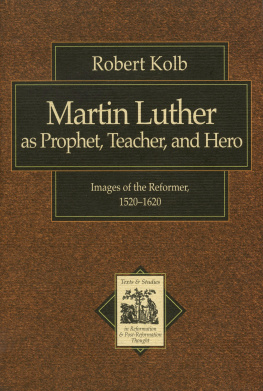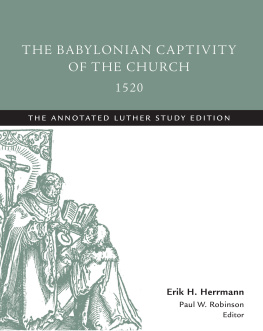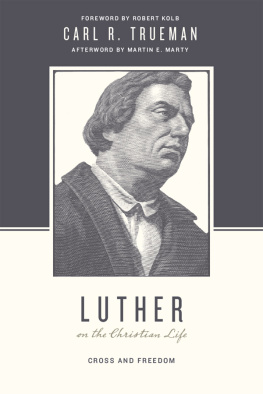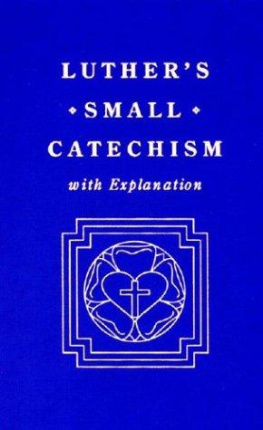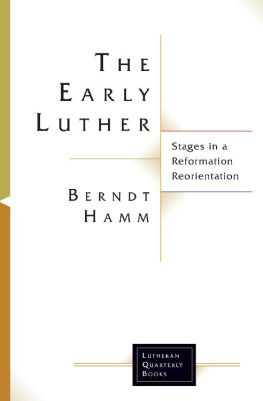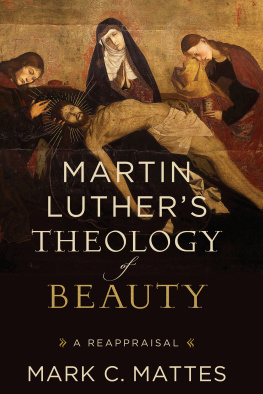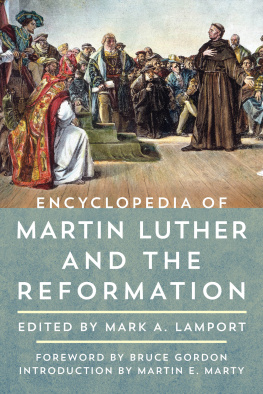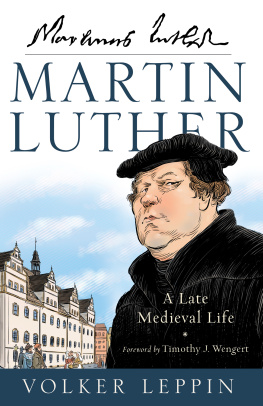Luther Refracted -- Luther Refracted
1
Additional Praise for Luther Refracted
Martin Luther is a more polyphonic and full-bodied theological figure than ecumenists usually assume. This volume discovers a variety of ways in which the Reformation contributes to the unity of the church. In our multicultural modernity, ecumenism needs the rich powers of theological imagery and imagination present in Luther.
Risto Saarinen
University of Helsinki
In this important new work, editors Malysz and Nelson daringly hand over the richest treasure in the Lutheran tradition, Martin Luther himself, to a wide range of generous and vigorously engaged ecumenical conversation partners: Catholic, Baptist, Evangelical, and more. They do not, in other words, tell their ecumenical partners what their Martin Luther has to say but instead listen with patience to a varying series of answers to the question how those partners hear Luthers voice. The result is a Luther ready and able to surprise and to contribute to theology today, a Luther who provokes a constructive pan-Christian conversation that beckons the divided churches beyond mere convergence toward listening and learning together. In short, these essays model a new kind of ecumenical engagement that invites diverse Christian readers to share the task of understanding anew their divided traditions, in the hope that they will be led toward the unity that only Spirit can give. An exciting venture!
Mickey Mattox
Marquette University
Martin Luther is one of those rare Christian theologians who belong to all Christian theology. With these perceptive words David Tracy concludes his contribution to this remarkable volume on Luthers theology. Malysz and Nelson have assembled contributions of established authors hailing from various denominations who make two points clear: Luthers theology continues to influence and stimulate the whole of Christendom. Though Luther was neither infallible nor a saint, his theological insights provide valuable resources across denominational lines. This book needs to be studied for the benefit of the open-minded reader.
Hans Schwarz
Emeritus, University of Regensburg
This symposium contributes to the emerging ecumenical consensus that Luthers theology can be a rich resource for all Christian churches and denominations. An aspect of this consensus is that Luthers followers have often diminished his greatness by practicing the art of selective reductionism to prove the superiority of their particular brand of Lutheranism. The pietists reconstructed Luther after their own image and the orthodox did the same. With hindsight we Lutherans must grudgingly admit that Luther was never a good Lutheran, judged by the criteria applied by the various denominations that bear his name.
Carl E. Braaten
Emeritus, Lutheran School of Theology at Chicago
In this book, world-class theologians move beyond dialogue designed for developing churchly position statements effectuating ecumenical rapprochement. Instead, by means of unguarded and critical engagement with Luther, essayists from a variety of confessional heritages address topics of perennial relevance, such as community, universal priesthood, ministry, faith, divine hiddenness, and the sacraments, and allow a new Luther and a new ecumenism to emerge. From the questions posed to Luther as well as the challenges that Luther poses to us we can foresee a thawing of the current ecumenical winter and the warming of a renewed theological collaboration across confessional lines.
Mark Mattes
Grand View University
The essays in Luther Refracted free Luther from captivity to confessionalist or modernist agendas and engage him in lively contemporary ecumenical-theological conversation. A valuable stimulus for anyone interested in the continuing vitality of Luthers theological legacy.
David S. Yeago
North American Lutheran Seminary and Trinity School for Ministry
Luther Refracted
The Reformers Ecumenical Legacy
Piotr J. Maysz and Derek R. Nelson, editors
Fortress Press
Minneapolis
LUTHER REFRACTED
The Reformers Ecumenical Legacy
Copyright 2015 Fortress Press. All rights reserved. Except for brief quotations in critical articles or reviews, no part of this book may be reproduced in any manner without prior written permission from the publisher. Visit http://www.augsburgfortress.org/copyrights/ or write to Permissions, Augsburg Fortress, Box 1209, Minneapolis, MN 55440.
Cover image: Cranach, Lucas the Younger (1515-1586) Martin Luther. Location: Chiesa Evangelista Luterana, Venice, Italy. Photo Credit: Cameraphoto Arte, Venice / Art Resource, NY
Cover design: Tory Herman
Library of Congress Cataloging-in-Publication Data
Print ISBN: 978-1-4514-9038-1
eBook ISBN: 978-1-5064-0147-8
The paper used in this publication meets the minimum requirements of American National Standard for Information Sciences Permanence of Paper for Printed Library Materials, ANSI Z329.48-1984.
Manufactured in the U.S.A.
This book was produced using Pressbooks.com.
Contents
| BC | The Book of Concord: The Confessions of the Evangelical Lutheran Church, ed. Robert Kolb and Timothy J. Wengert (Minneapolis: Fortress Press, 2000). |
LW
| Luthers Works, American Edition, 82 vols. (Philadelphia: Fortress, and St. Louis: Concordia, 1955-). |
| WA | D. Martin Luthers Werke, Kritische Gesamtausgabe, ed. J. F. K. Knaake et al., 57 vols. (Weimar: Bhlau, 1883ff). |
The fast-approaching 500th anniversary of the Protestant Reformationto be celebrated, or perhaps lamented, in 2017has issued in a host of fresh portrayals and retrievals of the man who started it all: Martin Luther. This recent wave of interest in the person and thought of the Wittenberg reformer is, of course, nothing new. The twentieth century saw the emergence of several important schools of Luther interpretation, beginning with the German Luther Renaissance in its early decades. The quincentenary of Luthers birth in 1983 marked the first truly ecumenical celebration of Luthers achievement, following on the heels of post-Vatican II fascination with Luther among Roman Catholic scholars (discussed in the present volume by Jared Wicks) as well as ecumenical dialogue with Eastern Orthodox churches. Those ecumenically minded engagements culminated, in 1999, in the signing of the Joint Declaration on the Doctrine of Justification between the Pontifical Council for Promoting Christian Unity and the Lutheran World Federation. Since then, we have seen still newer biographical attempts to understand Luther as, for example, a rebel in a time of upheaval, cast in relief against the backdrop of the early modern struggle over the role of religion;
Luthers historical significance and the long shadow the Reformation has cast over the shape of modernity go without saying. On this all the contributors to the present volume are agreed. But this book would never have come into existence, if the contributors conviction did not go significantly beyond merely asserting that Luthers voice is one to be reckoned with. All the essays included here show that Luthers remains above all a voice genuinely worth hearing. Five hundred years after the Wittenberg professor called for a public debate on indulgences, Luther still has something to teach us. He still calls todays church to reflection, and does so across denominational boundaries, the presence of which has not infrequently been blamed on him. If only for this reason, Luthers voice remains at the same time in need of being addressed, even from the vantage point of the early 21st century, when the very diverseand dividedChristian landscape appears to be a simple matter of fact.


